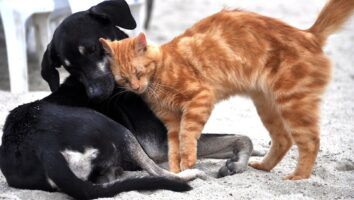Cat
What to Do if Your Pet Has a Bite Wound
Did your dog or cat get bitten by another animal? Don't panic! There are many things that you can do to help your pet. The first step is to verify that your pet is up-to-date on vaccines. If not,…
My dog’s wound won’t heal. What should I do?
The curious streaks and playful nature of dogs can easily get them into trouble. It’s no wonder why they end up with wounds when playing, getting into fights with other animals, or by accident.…
How to Prevent Flystrike in Dogs and Cats
Flystrike in dogs and cats is one of those skin conditions where treatment and preventive medication is not readily available. It’s important that pet owners are aware of how this skin problem…
Cuterebra Infestation in Dogs and Cats
Skin parasites are a common problem in dogs and cats. Commonly encountered external parasites, like fleas, lice, and ticks, can easily be treated and controlled with over-the-counter preventive…
Ringworm Symptoms and Treatment in Cats
Skin disorders are very common in cats. Studies have shown that around 15% of cats have at least one skin problem. Among these skin problems, infections are considered to be the most common. Skin…
FirstVet + Basepaws
FirstVet services just got even better for cat lovers! We’ve teamed up with Basepaws Pet Health to help our pet parents better understand their cat’s healthcare needs. As a FirstVet customer, you…
Pemphigus in Cats
Pemphigus can best be described as an immune-mediated skin disease in cats where a cat’s own immune system begins to attack the connection between the normal layers of skin cells. While there are…
Why is my cat panting?
Panting is defined as a rapid, short, breathing pattern, usually done with an open mouth. Panting in dogs is often considered normal and isn’t usually a cause for concern. In cats, however, panting…
Causes of Yellow/Green Discharge from Your Cat’s Nose
Nasal discharge is a common symptom seen in cats with upper respiratory airway problems. The nasal passages filter everything the cat inhales to prevent it from traveling and affecting deeper parts…
Lung Cancer in Dogs and Cats
Lung cancer is one of the most commonly diagnosed cancers in humans. Given how serious and common lung cancer is in humans, it’s normal to wonder if this deadly disease also affects our pets. Cancer…
Pet Medication 101: Trazodone
It’s important to understand a medication’s uses and side effects before giving it to your pet. This medication info sheet is meant to give you a good understanding of what trazodone (Desyrel) is…
Melanoma in Cats
Melanomas are tumors of pigment-producing cells known as melanocytes. These abnormal growths can be benign or malignant. Although melanomas are quite rare in cats, they can still be a cause for…
Squamous Cell Carcinoma in Cats
Squamous cell carcinoma (SCC) is a tumor that affects the cells of the skin. The skin is composed of several layers of cells. The squamous layer is located in the epidermis, which is the outermost…
Common Skin Tumors in Cats
The skin is the largest organ of the body. Because it is constantly exposed to many cancer-causing factors in the environment, such as UV rays, chemical carcinogens, and viruses, skin tumors are the…
Pulmonary Hypertension in Dogs and Cats
Pulmonary hypertension, a common health condition seen in humans, is also frequently reported in dogs and cats. It’s important to recognize changes in your pet’s heart and lung health so a diagnosis…
Nasal Tumors in Dogs and Cats
Nasal tumors in pets are relatively uncommon, accounting for only 1% of all cancers in dogs. However, they are the most common tumors found along the respiratory tract, responsible for around 60-80%…
Nasal Polyps in Cats
Signs of upper respiratory tract problems like nasal discharge and sneezing are relatively common in cats. Oftentimes, signs like these are harmless and resolve on their own with no need for…
Pulmonic Stenosis in Dogs and Cats
Pulmonic stenosis is a congenital heart defect that is commonly diagnosed in dogs but is rare in cats. The condition is characterized by the narrowing of the pulmonary valve in the heart which…




















